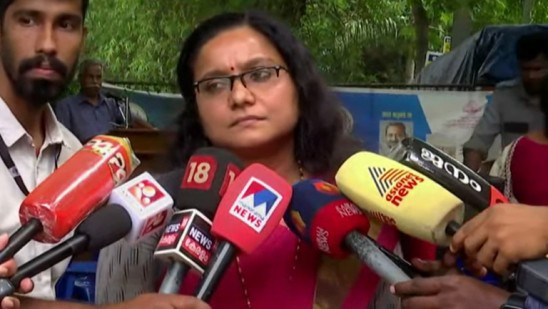
Kerala High Court raps media, upholds CPI(M) leader’s wife’s appointment

The Kerala High Court has pulled up media for poking its nose into matters involving legal complexities and called for “responsible conduct” even as it upheld the appointment of a CPI(M) leader’s wife as an associate professor.
The high court overturned a single bench’s decision that had invalidated the appointment of Priya Varghese, wife of KK Ragesh, a former Rajya Sabha member who serves as Chief Minister Pinarayi Vijayan’s private secretary.
Priya’s appointment to the Malayalam Department at Kannur University triggered a huge row, escalating the hostility between Governor Arif Mohammed Khan and the Left Democratic Front (LDF) government led by the Communist Party of India (Marxist). The governor had suspended the appointment, alleging political favouritism and violation of rules.
Varghese filed a writ with the High Court contesting the judgemnt by Justice Devan Ramachandran which stated that “a competent authority to reconsider Varghese’s credentials and decide whether she should be in the ranked list”.
Court overruled
Justice Ramachandran, while hearing a petition challenging her selection, had found that Varghese did not have the qualification required, particularly teaching experience, to become an associate professor.
Allowing the writ appeal by setting aside the impugned judgment, a Division Bench of the high court upheld her appointment as associate professor.
In a postscript to the order allowing Priya’s appeal, the high court has criticised the media for being unmindful of the harm caused to the litigant’s dignity and reputation through unjustified comments and remarks.
“Frighteningly frequent are those occasions when the impugned decision in academic matters attracts media attention for some reason or the other, and the court has then to deal with the added distraction brought about through incessant newspaper/channel discussions and overwhelming social media posts.
“It is for this reason that courts have time and again exhorted the print and electronic media to exercise restraint by deferring discussions on matters pending before the court so that the rule of law can be better served by avoiding an obstruction of the course of justice,” read the order.
Irresponsible media
The judgment went on: “On its part, the media cannot be unmindful of the harm that is caused to a litigant’s dignity and reputation through unjustified comments and remarks, often based on the oral remarks made by a judge during the adjudication proceedings, notwithstanding that the litigant ultimately succeeds in those proceedings.
“They must note that no less a constitutional functionary than the Chief Justice of India had recently observed that not everything that is said by a judge during the course of interaction with counsel in court can be taken as revealing the judge’s views on the merits of the cause that is being adjudicated.
“While the right to a fair trial has long been recognised as forming part of the fundamental right of a citizen under Article 21 of the Constitution, in recent times, the right to privacy has also been recognised as forming part of the said right through the judgment of the Supreme Court.
“Even prior to the said judgment, the right to protect one’s reputation was recognized as forming part of the fundamental right under Article 21 of the Constitution. The International Convention on Civil and Political Rights, 1965, also recognises the right to have opinions and the right of freedom of expression subject to the right of reputation of others.”
Appeal to media
In conclusion, the court stated that Granville Austin in his treatise on “The Indian Constitution – The Cornerstone of a Nation” stated that while the guarantee of fundamental rights was mostly seen as offering individuals and minority groups protection against arbitrary and prejudicial state action, there were provisions which abolish untouchability, which lay down that no citizen shall suffer any disability in the use of shops, restaurants, wells, roads and other public places on account of his religion, race, caste, sex or place of birth and which prohibit forced labour, designed to protect an individual against the actions of other private citizens.
“On account of its nature as a right that is personal to an individual, we are of the view that the newly recognised fundamental right to privacy, which takes within its fold the right to protection of one’s reputation as well, would merit classification as a fundamental right that protects an individual, not only against arbitrary State action but also against the actions of other private citizens, such as the press or media.
“We trust, therefore, that the media will take note of these observations and adopt a code of responsible journalistic conduct that will inform news reporting in the days to come.”


